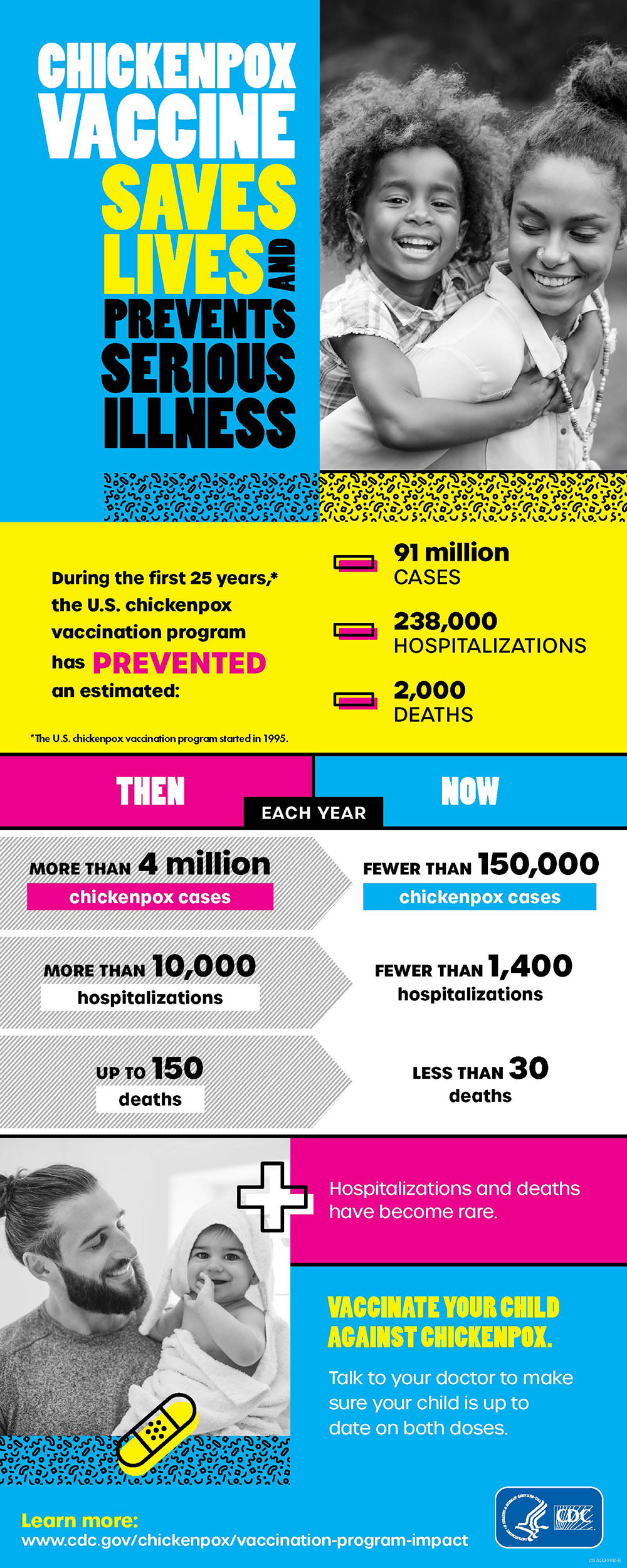Key points
- Two doses of the chickenpox vaccine are recommended for children by doctors as the best way to protect against chickenpox (varicella).
- People who have never had chickenpox or received chickenpox vaccine should get 2 doses.
- Most people who get the vaccine will be protected for life and not get chickenpox.

Introduction
The best way to protect against chickenpox is to get the chickenpox vaccine. The chickenpox vaccine prevents almost all cases of severe illness. Instead of MMRV, some children might receive separate vaccines for MMR (measles, mumps, and rubella) and varicella (chickenpox).
If a vaccinated person does get chickenpox, called breakthrough chickenpox, the symptoms are usually mild. Vaccinated people often experience fewer to no blisters and low or no fever, but red spots may occur.
Available vaccines
There are two chickenpox vaccines licensed in the United States. The chickenpox vaccine may be given at the same time as other vaccines. Your healthcare provider can give you more information.
Varivax®
- Contains only chickenpox vaccine.
- Is licensed for use in people 12 months or older.
- Can be given to children for their routine 2 doses of chickenpox vaccine at 12–15 months old and age 4–6 years old.
ProQuad®
- Contains a combination of measles, mumps, rubella, and varicella (chickenpox) vaccines, which is also called MMRV.
- Is only licensed for use in children 12 months–12 years old.
Recommendations
Children under 13 years old should get 2 doses.
12–15 months old
1st dose
4–6 years old
2nd dose
People 13 years and older who have never had chickenpox or received chickenpox vaccine should get 2 doses. The doses should be at least 28 days apart. People should also get a second dose if they have had only one chickenpox dose. Instead of MMRV, some children might receive separate vaccines for MMR (measles, mumps, and rubella) and varicella.
After exposure to someone with chickenpox
Getting vaccinated after you are exposed to someone with chickenpox can:
- Prevent the disease or make it less serious.
- Protect you from chickenpox if you are exposed again in the future.
A healthcare provider can prescribe a medicine to make chickenpox less severe if you:
- Are exposed to chickenpox.
- Do not have immunity against the disease.
- Are not eligible for vaccination.
Why getting vaccinated is important
Chickenpox is usually mild. However, it can be serious during pregnancy, in infants under 12 months old, adolescents, adults, and people with weakened immune systems.
Some people get so sick that they need to be hospitalized. It doesn’t happen often, but people can die from chickenpox. Most people who are vaccinated with 2 doses of chickenpox vaccine will be protected for life.
Chickenpox is a mild disease for many children, but not for all. There's no way to know who will have a serious case. With vaccination, your children get immunity from chickenpox without the risk of serious complications caused by the disease itself.
Who should get vaccinated
Everyone should get 2 doses of chickenpox vaccine if they have never had chickenpox or were never vaccinated.
Chickenpox vaccination is especially important for:
- Healthcare professionals
- Anyone who cares for or are near people with weakened immune systems
- Residents and staff in nursing homes and other residential settings
- Teachers, childcare workers, & anyone living with children
- College students
- Inmates and staff of correctional institutions
- International travelers
- Military personnel
- Non-pregnant women of childbearing age
Who shouldn't get vaccinated
Some people should not get chickenpox vaccine, or they should wait. Check with your healthcare provider if you:
- Have HIV/AIDS or another disease that affects the immune system.
- Are being treated with drugs that affect the immune system for 2 weeks or more.
- Have any kind of cancer.
- Are getting cancer treatment with radiation or drugs.
- Recently had a transfusion or were given other blood products.
- Are pregnant or may be pregnant.
The vaccine is safe and effective
The chickenpox vaccine is safe, and it is effective at protecting against chickenpox. Vaccines, like a medicine, can have side effects. These are usually mild and go away on their own.
Two doses of the vaccine are about 90% effective at preventing chickenpox. When you get vaccinated, you protect yourself and others in your community, especially people who cannot get vaccinated. Since the chickenpox vaccination program began in the United States, there has been over 97% decrease in chickenpox cases. Hospitalizations and deaths have become rare.
Possible side effects
Most people don't have any side effects from the vaccine. The side effects that do occur are usually mild, and may include:
- Soreness, redness, or swelling where the vaccine was given
- Fever
- Mild rash
Finding and paying for the vaccine
Your or your child’s doctor’s office is usually the best place to receive recommended vaccines. Vaccines may also be available at pharmacies, workplaces, community health clinics, health departments, schools, or religious centers.
Vaccine costs
There are a few ways to cover the cost of vaccines:
Health insurance
Most health insurance plans cover the cost of vaccines. However, you may want to check with your insurance provider before going to a healthcare provider. Check for cost information and for a list of in-network vaccine providers.
Vaccines for Children Program
Your children may be able to get no-cost vaccines through the Vaccines for Children (VFC) Program. This program helps families of eligible children who may not be able to afford or have access to vaccines.
Common questions
All 50 states and DC have state laws that require children entering childcare or students starting schools to have certain vaccinations. There is no federal law that requires this. The ACIP recommends that all states require these groups to be up to date on chickenpox vaccine.
Students in school settings have a higher likelihood of spreading chickenpox because they are constantly in close contact with each other. Chickenpox vaccine prevents outbreaks in these setting, which means:
- Less illness and less school time missed by students.
- Less chance of exposing people who cannot get vaccinated.

